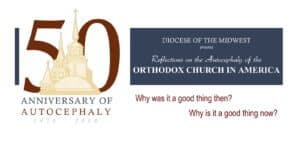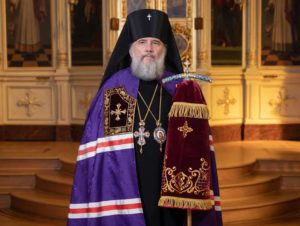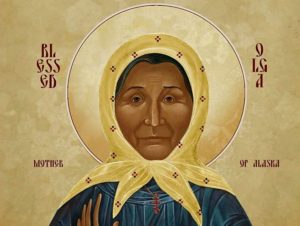PART VIII
“For it seemed good to the Holy Spirit, and to us …” (Acts 15:28). These are the iconic words used in the letter to the Gentiles announcing the decision of the Council of Jerusalem and it accurately reflects my thoughts on the autocephaly of the Orthodox Church in America.
I came into the world more than a decade after the granting of autocephaly and it was close to another decade before I became Orthodox. I was baptized with my father and brothers at St. Gregory Palamas Monastery in Ohio. I still have fond memories of visiting the monastery – the smell of the candles, the visual beauty of the church, watching the monks at the chanter’s stand during the services. After moving, we attended an Antiochian parish for a while before finding a Greek parish closer to home. My brothers and I served as altar boys at most of the services. While I was the typical boy who periodically complained about having to serve all the time, I still remember moments of feeling pure joy and being in awe of the beauty of the services, particularly during Holy Week and Pascha.
After moving again, we attended the local Ukrainian Orthodox Church. Rather than serving as an altar boy, I joined the choir and discovered the beauty of Orthodox hymnography. The choir director took an interest in me and taught me the basics of reading music and singing. My father was eventually ordained to the priesthood and sent to western Pennsylvania to help minister several rural Ukrainian Orthodox parishes. After several years, we ended up finding our home in the Diocese of the Midwest of the Orthodox Church in America (OCA).
These parishes of other Orthodox jurisdictions we attended treated us very well. Even so, I think Protinica Michelle Jannakos made an excellent observation in her reflection concerning the difficulties that follow from having Mother Churches overseas versus having a local autocephalous Church. While many of the other jurisdictions have varying degrees of independence, they are ultimately all answerable to a Mother Church overseas that is in a different culture and has a different language. I think it possible that some of the bad experiences one hears tell of in parishes from other jurisdictions have been caused by cultural conflict – old world culture meeting American culture – and people not understanding each other.
The mission of the OCA is to bring “all people to the knowledge of truth” by following the great command given by Christ to the apostles at the end of the Gospel of Matthew: “Go into all the world and make disciples of all Nations, baptizing them in the name of the Father, and of the Son and of the Holy Spirit, teaching them to observe all things that I have commanded you” (Mt. 28:19-20). Part of the Mission Statement of the OCA is also to “utilize for her mission the various languages of the peoples of this continent” (oca.org/about/mission-vision).
This is precisely what the Church has always done: evangelize and missionize the people in their own language. This is one reason why I think the autocephaly of the OCA was and is good. The Church historically translated the services, scriptures, and even the writings of the Fathers into the native languages of the people she served. In areas where there was no written language, an alphabet was created so that the native people of that area could read the scriptures and participate in the services; for example, Sts. Cyril and Methodius, and St. Innocent of Moscow.
Today there are still many parishes in America where large portions of the services are done in a foreign language. This is fine in parishes where a large majority of the people are immigrants and are fluent in the language. However, I have attended services in parishes where most, if not all, of the people could not speak the language used in the service. In some cases, the services were done in an ancient form of the language, but the people spoke and understood only the modern version of the language. In other cases, the people neither spoke nor understood the mother tongue but wanted to hear it because it brought back memories of their younger days. I have seen people walk into an Orthodox church during a portion of a service that was done in a foreign language, pick up a service book and skim through it a bit, then walk out again, presumably because they had no idea what was happening.
Because of a nostalgic allegiance to a foreign language few if any understood, this church failed to evangelize the people in that particular locality. This was a parish in which a small portion of the parishioners were native speakers of the foreign language and a large portion of the parishioners came from a different ethnic/cultural background. One language all these ethnically diverse parishioners have in common, though, is English, which is also the language of the people they are called to evangelize.
I love to listen to hymns and services in other languages, but having services in a language that is foreign to most or all of the people does not make sense. There is no spiritual benefit to listening to something you can’t understand, especially when the services and scriptures are readily available in English. This reminds me very much of the scripture references of those who “have eyes to see, but do not see, and ears to hear, but do not hear” (Ezekiel 12:2; see also Isaiah 6:9-10, quoted by Christ in Matthew 13:14-15; Psalm 113: 13b-14a (Septuagint); and Jeremiah 5:21). In order for the people to “see” and “hear” we need to speak their language. It is far easier for us to participate in the worship of God when we understand the language. There is nothing wrong with individuals and communities holding on to their cultural heritage. It becomes detrimental when we elevate it to the same status as our faith, when we keep it in the Church long after we can no longer understand it. In order to be faithful to the command of Christ in Matthew 28:19-20, we must be faithful to the history of the Church by preaching and teaching in the language the people understand. The autocephaly of the OCA has allowed us to pursue and fulfill this mission.
Our autocephaly has allowed us serve in the language of the people, in the culture of the people, in the nation we are serving. It has also given us a hierarchy that lives in and understands the culture to which we are ministering. In his address to the First All-American Council in 1970, Metropolitan Ireney said: “The Autocephaly of our Church is canonical, because her faith is the faith of the Universal Church. … Canonicity is not determined by recognition or non-recognition, for recognition alone does not make canonicity canonical – but rather its correspondence to the canonical tradition of the Church” (Met. Ireney, “Report on Autocephaly,” 1st AAC, October 20-22, 1970). Our focus in the OCA needs to be on carrying out the mission of the OCA in accordance with the Tradition of the Church and witnessing to the new life found in Christ to the people of North America.
Metropolitan Ireney ended his report by saying, “The success of our calling depends on each one of us – every parish, every priest, every layman! It is up to us to show not only in words, but also in deeds: our maturity, love, understanding. … Let us enter with prayer on this fruitful fulfillment of the Church” (Met. Ireney, “Report on Autocephaly,” 1st AAC, October 20-22, 1970). If we want our autocephaly to be successful, we must each one be faithful to the apostolic Tradition of the Church. We cannot give what we do not have. We have to grow in our spiritual life and strive to acquire the grace of the Holy Spirit so that thousands around us may be saved (see St. Seraphim of Sarov’s conversation with Motovilov).




